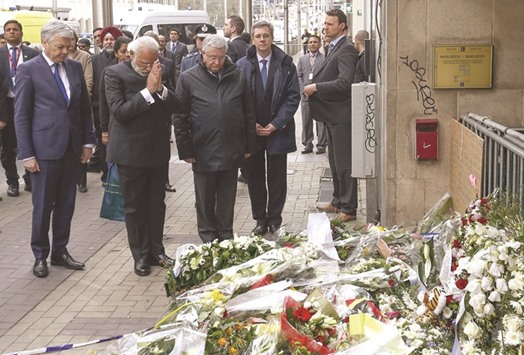Prime Minister Narendra Modi yesterday offered his deepest condolences to the families of the victims of the March 22 terror attacks in Brussels, and said an extradition treaty between India and Belgium should be expedited.
He said India shared Belgium’s pain over the attacks as he added a wreath of white flowers to a sea of tributes outside Maalbeek metro station.
Flanked by Belgian Foreign Minister Didier Reynders, Modi bowed his head and clasped his hands together in tribute to the victims of the suicide blasts, which struck a train at the station and the city’s airport.
An Indian citizen, a 31-year-old IT worker, was among the 32 people killed in Belgium’s worst-ever terror attacks.
“Last week has been a sad week for Belgium,” Modi said in a speech alongside his Belgian counterpart Charles Michel.
“Having experienced terrorist violence ourselves on countless occasions, we share your pain,” he said.
“In this time of crisis, the whole of India stands in full support and solidarity with the Belgian people.”
Modi said: “As part of our efforts to respond to this common challenge we could resume discussions on a mutual legal assistance treaty. Negotiations on extradition treaty and a treaty on exchange of sentenced prisoners could be concluded expeditiously.”
He said that India and Belgium shared a long history of friendship.
“A hundred years ago, more than 130,000 soldiers from India fought in the First World War alongside your countrymen on Belgian soil,” the prime minister said.
“More than 9,000 Indian soldiers made the supreme sacrifice.”
Modi said that India was ready to welcome Belgian King Phillipe next year which will mark 70 years of diplomatic ties between the two countries.
He said his talks with Michel earlier in the day covered the whole spectrum of ties.
“A system of bilateral foreign policy consultations would recommend concrete ways to upgrade our partnership,” Modi said.
Referring to the economic opportunities India offered to the world today, Modi said the India’s macroeconomic fundamentals were robust, and at 7% plus, it was one of the fastest growing economies of the world.
“I believe that a combination of Belgian capacities and India’s economic growth can produce promising opportunities for businesses on both sides,” he said.
“The prime minister and I have just held a productive interaction with Belgian CEOs and business persons earlier today. I invite the Belgian government and companies to pro-actively associate with India’s ambitious development projects including Digital India, Start Up India and Skill India.”
According to Modi, Belgian businesses can make their global supply chains more cost effective by manufacturing in India.
“India’s goal to modernise infrastructure, especially railways and ports, and building of 100-plus smart cities also presents a unique investment opportunity for the Belgian companies,” he said.
Later in the day, Modi met with EU President Donald Tusk and European Commission President Jean-Claude Juncker for talks expected to focus on trade co-operation and counterterrorism efforts.
The summit in Brussels - the 13th such meeting between the European Union and India - is the first to take place since 2012. New Delhi hopes it will also help to improve relations amid a diplomatic row with Italy.
“The EU is one of our strongest strategic partners,” Modi said.
Indian diplomats said that both sides were looking to take forward negotiations on Broad-based Trade and Investment Agreement (BTIA) talks, which started in 2007 but have stalled since 2013.
Key sticking points in the trade talks include European demands that India remove tariffs on cars and car parts, wine and spirits. The EU is India’s largest trading partner.
EU exports to India totalled just over €38bn ($42.6bn) in 2015, while Indian imports to the bloc reached almost $40bn, according to data released yesterday by the EU statistics agency Eurostat.
Ahead of the talks, the medical charity Doctors Without Borders (MSF) called on Modi to refrain from agreeing to any trade concessions that could impact the country’s production of generic medicines, which tend to be far cheaper than brands marketed by large pharmaceuticals.

Prime Minister Narendra Modi pays tribute to the victims of the Brussels terror attack at a street memorial outside Maelbeek metro station yesterday.
